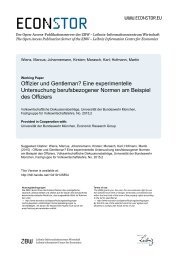DISCUSSION
n?u=RePEc:iza:izadps:dp10283&r=exp
n?u=RePEc:iza:izadps:dp10283&r=exp
You also want an ePaper? Increase the reach of your titles
YUMPU automatically turns print PDFs into web optimized ePapers that Google loves.
We develop a model of goal setting to help understand our findings. We start with a baseline<br />
model in which either type of goal can help students to mitigate their self-control problem. At<br />
period one the ‘student-planner’ sets a goal for her future self, at period two the ‘student-actor’<br />
chooses how hard to work, and at period three performance in the course is realized. The student<br />
is present biased, and so in the absence of a goal the student exhibits a self-control problem<br />
due to time inconsistency: when the time comes to work the student-actor works less hard than<br />
the student-planner would like. By acting as salient reference points, the theory suggests that<br />
self-set goals can serve as an internal commitment device that helps students who anticipate<br />
their self-control problem to steer their effort toward its optimal level.<br />
We then use this model to explain why task-based goals can be more effective than performancebased<br />
goals. This finding emerges naturally if we relax either of two strong assumptions made in<br />
the baseline model, namely that students understand perfectly the relationship between effort<br />
and performance and that this relationship involves no uncertainty. First, if practice exams are<br />
more productive than those tasks that an overconfident student would select for herself, then<br />
task-based goals will be more effective than performance-based goals. 4 Second, a stochastic<br />
relationship between effort and performance (‘performance uncertainty’) makes performancebased<br />
goals risky: when performance turns out to be low the student fails to achieve her goal.<br />
Anticipating this possibility, the student scales back the performance-based goal that she sets<br />
for her future self, which decreases the effectiveness of goal-setting. In contrast, these effects<br />
of performance uncertainty are not present in the case of task-based goals because the student<br />
directly controls the number of practice exams that she completes and so can guarantee that<br />
she achieves her task-based goal.<br />
Our paper makes two contributions to the literature. The main contribution is to use experiments<br />
to provide causal estimates of the impact of self-set goals on the effort and performance<br />
of college students. These estimates suggest that self-set performance goals are ineffective while<br />
self-set task-based goals help college students to overcome their self-control problem. Our finding<br />
that performance-based goals are ineffective stands in stark contrast to a literature in educational<br />
psychology that uses non-causal correlations to suggest that performance-based goals can<br />
motivate college students (see, e.g., Zimmerman and Bandura, 1994, Harackiewicz et al., 1997,<br />
Elliot and McGregor, 2001, Barron and Harackiewicz, 2003, Linnenbrink-Garcia et al., 2008 and<br />
Darnon et al., 2009). 5 A handful of papers in psychology use experiments to study the effects<br />
of self-set goals on the behavior of college students (Morgan, 1987; Latham and Brown, 2006;<br />
Morisano et al., 2010; Chase et al., 2013); however, in contrast to our analysis, these studies<br />
rely on small samples, do not study the impact of performance-based goals on performance or<br />
4 Our overconfidence explanation implies that students have incorrect beliefs about the best way to increase<br />
their academic achievement. This is consistent with the explanation given by Allan and Fryer (2011) for why<br />
performance-based financial incentives appear less effective than task-based financial incentives.<br />
5 Relying on correlations based on non-experimental variation in our sample, rather than on the causal effects<br />
estimated solely from variation induced by our experimental interventions, would give a misleading impression<br />
of the effectiveness of performance-based goals. This is because we reproduce the correlational finding from the<br />
educational psychology literature that college students who set ambitious performance-based goals perform better.<br />
Specifically, conditional on student characteristics, the correlation in our sample between course performance<br />
(measured by total number of points scored out of one hundred) and the level of the goal is 0.203 (p = 0.000) for<br />
students who set performance-based goals. For students who set task-based goals the corresponding correlation<br />
is 0.391 (p = 0.000), which is also in line with correlational findings from educational psychology (see, e.g., Elliot<br />
and McGregor, 2001, Church et al., 2001, and Hsieh et al., 2007).<br />
3




